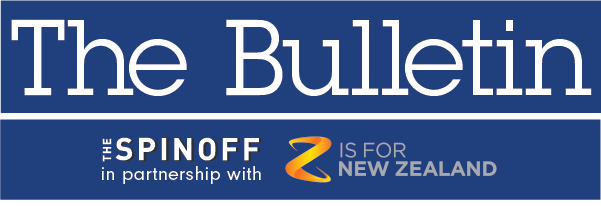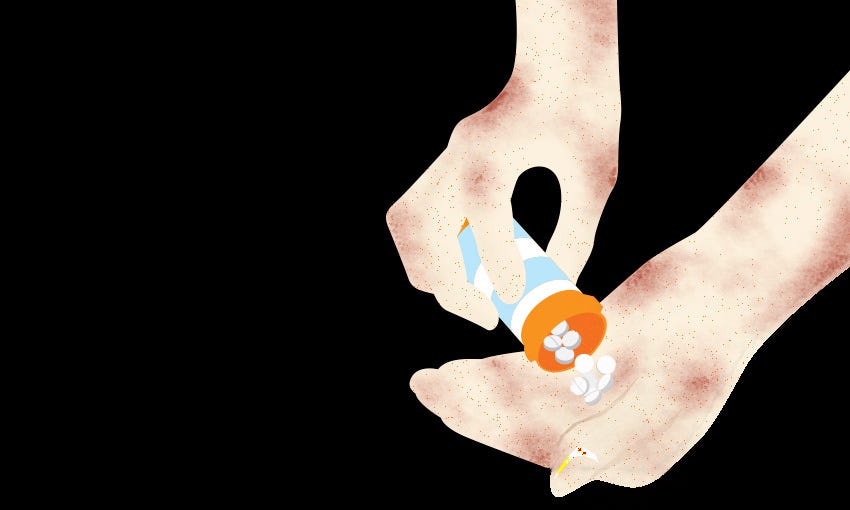Buy now, pay forever?
Calls for buy-now, pay-later providers to be regulated as millions of dollars in late fees are paid annually by New Zealand consumers.
Mōrena and welcome to The Bulletin for Monday, September 27. Today’s edition brought to you by Madeleine Chapman. Presented in partnership with Z Energy.
In today’s edition: Sir John Key tackles the Covid response, New Zealand hits the five million vaccine mark, and Dan Hooker tackles Nasrat Haqparast. But first, wariness grows around buy-now, pay-later services.
Pay phone (Getty Images)
Buy now, pay forever?
Consumer NZ is calling for buy-now, pay-later services to be regulated under the Credit Contracts and Consumer Finance Act after its survey found that New Zealanders are paying more than $10 million a year in late fees charged by such services as Afterpay, Laybuy, Humm and Zip. The survey also found that over half of buy-now, pay-later customers say they had felt encouraged to make purchases they otherwise wouldn’t have.
What is buy-now, pay-later?
Through buy-now, pay-later services, consumers purchase goods upfront without paying the full cost, then pay the rest in small instalments (four instalments for Afterpay, six for Laybuy). The payment option is appealing thanks to being interest-free, but late payments incur a fee. Consumer NZ’s survey found that 40% of New Zealand consumers had used a buy-now, pay-later service and more than one in three of those had paid a late fee.
So what’s the problem?
By charging no interest, buy-now, pay-later providers are not considered lenders of credit and therefore don’t fall under the Contracts and Consumer Finance Act, which requires lenders to conduct affordability checks and take further steps to ensure they are not causing harm to the customer.
Consumer NZ’s Gemma Rasmussen says no matter how it’s dressed up, these providers are in the lending space. The breaking up of payments can help to minimise the feeling of taking on a debt, making it more palatable, but “the implications are the same”.
Afterpay, for example, is available through an app, proclaims to “never do credit checks”, and takes mere minutes to join before users are informed they have $600 “available to spend”. Users can then shop at dozens of retailers directly through the app. Anecdotal reports of people signing up to multiple platforms and finding themselves with up to a dozen small loans to repay simultaneously have become more frequent for some 900 financial mentors around the country.
Jake Lilley, policy advisor at FinCap, the organisation that supports those financial mentors, says by not being required to conduct affordability checks, buy-now, pay-later providers are able to supply multiple lines of credit to consumers who are already struggling. He says it’s not about shutting down the services, but ensuring they “check before they lend to someone that taking up a loan wouldn’t mean they have to decide between paying rent and buying food”.
So what’s the solution?
Regulation. “It’s good for there to be competition for things like credit cards but it’s just more about where it’s sitting,” says Rasmussen. “We think it should be sitting as a credit product and it’s really problematic that it’s not covered under the Act.”
Lilley agrees. “It might be a lot better for people than other types of loans but they should be regulated like any other lender.”
Is that likely to happen?
When new regulations for lenders were being discussed in 2018, buy-now, pay-later was brought up as a growing area, leading to a provision allowing for the commerce and consumer affairs minister to bring them into the regulations at a later date if they feel there’s enough evidence to warrant it.
In July, Newshub reported that minister David Clark had met with representatives from six buy-now, pay-later providers and warned them they may soon be made to comply with responsible lending laws. Clark was seeking more information from the six providers before the release of a discussion document on the sector later this year. The $10 million per year that New Zealanders are currently paying in late fees certainly falls under “more information”.
If you like what you’re reading, we need your support. The Spinoff is doing our utmost to keep you updated on Covid-19 related news. Every dollar our members contribute directly funds our editorial team and is devoted to ensuring we do more. Click here to learn how you can support the team today.
A weekend scrap: Sir John Key has written a critique of the government’s Covid-19 response plan. Covering all bases, Key’s op-ed was published in multiple outlets and compared New Zealand’s continued border closures to North Korea before suggesting a few ways New Zealanders could be incentivised to get vaccinated (including parking the Shot Bro bus outside a few nightclubs). Covid-19 response minister Chris Hipkins disagreed with Key’s assertion that New Zealand was a "smug hermit kingdom”.
"I think that's an insult to New Zealanders who have actually achieved some of the highest rates of freedom in the world by going hard and going early when we've needed to,” he told Jack Tame on Q&A.
The Covid numbers: 18 new community cases were reported yesterday in Auckland and 50% (8) of the previous day’s total were in the community while infectious. This brings the total number of community cases in this outbreak to 1,165.
The Spinoff’s Covid data tracker has the latest figures.
The five million mark. New Zealand has now administered more than five million doses of the Covid-19 vaccine. In August, when vaccinations started up again after a brief closure in level four, daily vaccine doses peaked at more than 90,000 a day. This month the daily figure is closer to 50,000. Chris Hipkins has thanked all those who “rolled up their sleeves” and urged all eligible New Zealanders to get vaccinated now, in order to “keep our collective feet firmly on the accelerator as our vaccine rollout continues”.
New Zealanders love homes, even ones that are destined for the sea. Stuff’s Eloise Gibson reports on the the waterside homes that are still selling for top dollar despite strong evidence suggesting they’ll be uninsurable, if not unliveable, within two decades thanks to coastal erosion. The phenomenon is the product of interplay between property speculation, council bureaucracy and misplaced optimism.
From the garage to Vegas. Dan Hooker has had a rough couple of months. When Auckland went into level four lockdown, the UFC lightweight formed a bubble with his City Kickboxing gym-mates (with the gym as their home) in order to keep training for his scheduled fight this past weekend. The bubble was broken up by police, and broken up again when he moved to his own gym, until Hooker was left training alone in his garage for a pivotal fight in his career. Visa troubles ensued and he wound up arriving in Las Vegas twelve hours before his weigh-in with opponent Nasrat Haqparast. After all that, Hooker won the bout in clinical fashion, and is now looking to move his career to the US along with his team mates, including middleweight champion Israel Adesanya.
Norway has lifted all restrictions after 561 days. Reuters reports that after a year and a half of some sort of Covid restriction across the country, Norway has scrapped it all, including social distancing. Executing the final step in a four-step plan to return to normalcy, prime minister Erna Solberg announced the move would come into affect this past weekend. Norway’s population is currently 67% fully vaccinated, and one of the few requirements of its citizens moving forward is that those who contract Covid-19 self-isolate to limit further transmission.
Got some feedback about The Bulletin, or anything in the news?
Get in touch with me at thebulletin@thespinoff.co.nz
Image: Tina Tiller
Right now on The Spinoff: Mirjam Geugsen has put together a helpful explainer for all those wondering if they can safely receive a vaccine (spoiler: almost everyone can). Hal Crawford assesses Facebook’s evolution from social media platform to classic publisher, and the responsibility that carries. Reweti Kohere reports from the (virtual) 2021 Property Conference, where build-to-rent was touted as a solution for New Zealand’s renting woes. Chris Schulz dives deep into ticket scalping platform Viagogo in a search for authentic concert tickets. And Becky Carruthers shares her chilling tale of contracting measles during the 2019 outbreak. A cautionary tale for those who “don’t bother” to stay up to date with vaccinations.
For a feature today, housing. Yes, there’s no shortage of housing stories in New Zealand, both those lamenting the state of it all and those celebrating two young people buying a home all on their own* (*it’s never on their own). But few stories about housing are as comprehensive, insightful and eloquent as Rebecca Macfie’s cover story for North & South’s September issue. Macfie, one of this country’s most respected journalists, takes a slow walk from one generation to the next, unearthing the cultural, political and systemic shifts that created “the great divide” in New Zealand housing.
Within a generation New Zealand’s home-owning democracy has been transformed into a class society divided by property wealth. Those who have it effortlessly accrue more of it, and can transfer the benefits of it to their offspring. Those shut out from it are condemned by income, age, race and circumstance to pay a large proportion of their wages to property investors for somewhere to live.
A time bomb of poverty among the elderly is coming down the line, as increasing numbers of people reach retirement without their own homes. Māori, excluded from their ancestral lands by war and theft, are being locked out from housing wealth: their rate of home ownership has plunged from over half in the 1980s to less than a third.
It is a catastrophe, but it is not an accident. It has been coming for three decades, and it is the product of deliberate choices.
First marathon, first win. The Berlin marathon was run last night and ended with two surprise winners, one of whom, Gotytom Gebreslase, was running her first marathon. The 26-year-old from Ethiopia finished in two hours and 20 minutes with an impressive fist pump and a nonchalant "although it was my first marathon, I was running to win". For balance, I ran my first (and last) marathon in Wellington in 2018 during an “unprecedented” thunderstorm and came dead last. Not a joke, literally last place.
That's it for The Bulletin. If you want to support the work we do at The Spinoff, please check out our membership programme.







